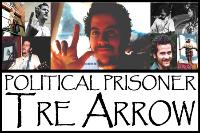Tuesday, February 19
U.S. Supreme Court Mum on Appeals Court's "Catch-22" Warrantless Wiretap Ruling
Earlies this afternoon (19 February), Wired News blogged this new development on the National Security Agency's warrantless eavesdropping on all US electronic communications, a program that was activated--contrary to White House claims and public belief- well BEFORE 9/11:
Supremes Won't Hear Warrantless Wiretapping Case
By Ryan SingelFebruary 19, 2008 | 12:52:58 PMCategories: NSA, The Courts
The Supreme Court turned down Tuesday a request to take up a challenge to the Bush Administration's warrantless wiretapping program, adding to the Administration's string of legal victories in challenges to the controversial, five-year-long program.The ACLU, representing lawyers, journalists and Muslim groups, challenged the program in 2006, arguing that the warrantless spying on international communications violated the Fourth Amendment and put a chill on the free speech of journalists.
The suit started in a Detroit federal court room, where in 2006 Judge Anna Diggs Taylor issued an injunction against the spying, which she found to be unconstitutional.
In July 2007, the Sixth Circuit reversed that decision simply on the issue of standing -- in layman's terms, having the right to sue. The court found that the plaintiffs couldn't prove they were spied on, so therefore could not sue.
In October, the ACLU asked the Supreme Court to review that 2-1 decision, which it called a Catch-22.
However, the Supreme Court declined, without comment, to hear the case, effectively blessing the appeals court decision.
That rankles Jameel Jaffer, director of the ACLU's National Security Project, who says the courts are abdicating their oversight role.
"The president violated the law for more than five years and we don't think that should go unremarked on by the Supreme Court." Jaffer said. "The effect is to let the executive branch police itself."
The Supreme Court's refusal to hear the case effectively puts an end to one of the most successful direct challenges to the surveillance program, which the government retroactively dubbed the "Terrorist Surveillance Program."
That program targeted both foreigners and Americans and listened in on their communications using wiretaps inside the U.S.. The New York Times revealed the existence of the program in 2005, and was soon followed by revelations about phone companies turning over all Americans' phone records to the government.
Then just prior to Democrats taking over the leadership role in Congress in 2007, Bush submitted the program for court approval. Within months, the secret spying court declared the program to be illegal.
The Bush Administration, citing a high threat level, then pushed Congress over the summer to give it warrantless domestic wiretapping powers, which were given for six months. Republicans and Democrats are now battling over an extension of those powers, as well as proposed immunity for the telecoms being sued for helping with the program.
Telecoms are facing some 40 lawsuits for their alleged participation in the massive violation of federal privacy laws. Despite the government's claim that the lawsuits would jeopardize national security, a federal judge in San Francisco has let a suit against AT&T proceed, ruling that the government can't declare the whole subject of the suit a secret when it admitted the program exists.
The U.S. Ninth Circuit Court of Appeals could hand down a decision in that case at any time. But any ruling could be moot, if Congress grants immunity to the telecoms.
The Senate voted for that get-out-of-court card last week, but the Democratic leadership in the House opposes that provision and wants to negotiate with the Senate.
In another challenge, lawyers for a now-banned Islamic charity were given a Top Secret document by the government, which they say proves they were spied on illegally. The Ninth Circuit dealt a blow to that case in November, sending it back down to the District Court, which has to decide if a law passed by Congress overrules the government's state secrets privilege.
UPDATE: Justice Department spokesman Erik Ablin says the department is "pleased with the court order."
See Also:
- House Democrats Stand Up To Bush, Refuse to Rubber Stamp Domestic Spying
- Gov Seeks Spy Suit Dismissal - Says It Now Gets Warrants
- Judge Halts NSA Snooping
- U.S. 9th Circuit Deals Setback to NSA Surveillance Victim
- ACLU Asks Supremes to Let Anti-NSA Spying Case Continue
- Appeals Court Tosses Anti-NSA Spying Suit
- Analysis: Spy Ruling Portends Hurdles for AT&T Eavesdropping Case











